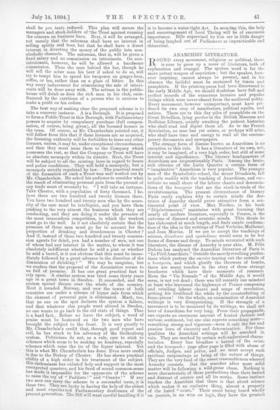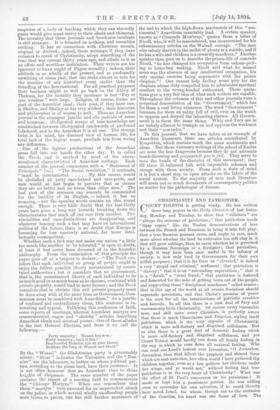ANARCHIST LITERATURE. R OUND every movement, religious or political, there is
sure to grow up a mass of literature, both of explanation and evangel. The spoken word is far the more potent weapon of conviction ; but the speaker, how- ever inspiring, cannot always be present, and in his absence the faithful must be sustained by tracts and pamphlets. If the printing-press bad been discovered in the early Middle Age, we should doubtless have full and perfect records of the numerous heresies and popular risings which were never absent from the mediceval polity. Every movement, however unimportant, must have pro- duced its own crop of manifestoes, political squibs, and satires. There are to this day piles of pamphlets on the Great Rebellion, lying perdus in the British Museum and Bodleian Library, quietly awaiting the patient historian who shall read and digest them all. As to the French Revolution, no man has yet arisen, or perhaps will arise, who shall have time and energy to read all the contem- porary documents and newspapers. The strange form of disease known as Anarchism is no exception to this rule. It has a literature of its own, not, it may be imagined, of a very high order, but still of some interest and significance. The literary headquarters of Anarchism are unquestionably Paris. " .Among the brain- sick eateries of the Latin Quarter a certain form of " imaginative " Anarchism is very popular. The younger men of the Symbolistic school, the minor Demdents, fall in quite readily with the teaching of Anarchism, and cor. tribute no small share of the labour chants and denuncia- tions of the bourgeois that are the stock-in-trade of the revolutionaries. The present circumstance of literary Paris easily explains why to certain minds the doc- trines of Anarchy should prove attractive from a sen- timental point of view. Max Nordau, in his book " Degenerescence," maintains with great learning that nearly all modern literature, especially in France, is the outcome of diseased and neurotic minds. This thesis he has elaborated at much length, and finds ample confirma- tion of the idea in the writings of Paul Verlaine, Mallarme, and ,Tean Moreas. If we are to accept the teachings of science, decadence and symbolisme would seem to be but forms of disease and decay. To minds saturated with such literature, the disease of Anarchy is near akin. M. Felix Dubois has analysed the Anarchist literature of Paris in "Le Peril Anarchiste." Outside the merely revolting produc- tions which portray the ouvrier tearing out the entrails of a bourgeois, and -which glorify the throwers of bombs, there are many touches in the story of these strange brochures which have their moments of romance Even the "Vie Nomad° " of the Middle Age, it would seem, is not yet dead ; there was till recently one minstrel at least who traversed the highways of France composing and retailing labour chants and songs of revolution, getting his livelihood the while by the counterfeiting of franc-pieces ! On the whole, an examination of Anarchist writings is very disappointing. If the strength of a movement is to be measured by its writings, we shall not hear of Anarchism for very long. From their propaganda. one expects an enormous amount of heated rhetoric and verbose sentiment, but one also expects something more— something strong and vigorous—were it only the fire and passion born of sincerity and determination. For these i qualities the Anarchist writings will be searched n vain. They are marked by certain well-understood charac teristics. Every line breathes a hatred of the aristo and the bourgeois; page after page is filled with abuse of officials, Judges, and police, and we must accept such spiritual outpourings as being of the nature of things. They are, the very food of the sweet reasonableness whereof Anarchy consists. But the searcher after more solid matter will be following a wild-goose chase. Nothing is more characteristic of these productions than their hatred and distrust of science and. all its works. Some instinct teaches the Anarchist that there is that about science which makes it an exclusive thing, almost a property of the hated "arisio." Their creed being based wholly on passion, in no wise on logic, they have the greatest suspicion of a body of teaching which they can shrewdly guess would give scant mercy to their ideals and chimeras. The morality that these journals and brochures inculcate is still stranger. It is founded on nothing, and resembles nothing. It has no connection with Christian morals, original or derived ; indeed, these writings, if they have occasion to speak of Christianity, adopt something of the tone that was current thirty years ago, and allude to it as an effete and worthless institution. Their writers are too ignorant to know ought of Pagan morality ; indeed, their attitude is so wholly of the present, and so profoundly unwitting of times past, that one seeks almost in vain for the mention of any historical event earlier than the founding of the International. For all practical purposes their teachers might as well go back to the Abbey of Thelema, for the morality they inculcate is but "Fay ce que voudras " writ large. Religion, of course, forms no part of the Anarchist ideal ; their poet, if they have one, is Shelley, and Shelley at his very wildest ; their historian and philosopher is of course to seek. Thus an Anarchist journal is the strangest jumble and olla podrida of sense and nonsense ; ill-digested scraps of true knowledge are sandwiched between oft-repeated catchwords of profound falsehood, and to the Anarchist it is all one. The strange twist in his mind, his diseased view of human life, his total lack of the logical sense, preclude him from seeing any difference. One of the lighter productions of the Anarchist press fell into our hands the other day. It is called the Torch, and is marked by most of the above- mentioned characteristics of Anarchist writings. Each number of the journal commences with a "Statement of Principals" [sic]. "The Social revolution," it contends, " must be international By this means would be abolished all petty race-hatred and race-pride, and men would at last begin to perceive that as classes they are no better and no worse than other men." The last part of the sentence can scarcely be commended for the lucidity of its English, — indeed, it has no meaning,—but the opening words contain an idea sound enough. There is very little doubt that the last thirty years have gone a long way towards breaking down the characteristics that mark off one race from another. Pro- vincialities and race-distinctions are disappearing, and whatever bearing such a fact may have on international politics of the future, there is no doubt that Europe is becoming far less narrowly national, far more intel- lectually cosmopolitan.
Whether such a fact may not make one nation "a little too much like another to be tolerated" is open to doubt, at least it has never been dreamed of in the Anarchic philosophy. From the enunciation of this principle the paper goes off at a tangent to declare :—" The Torch con- siders that each individual or group of people ought to enjoy the fullest possible liberty unrestrained by consti- tuted authorities ; but it considers that no government, that is, the unrestrained liberty of each individual to do as much good or as much harm as he chooses, combined with private property, would lead to mere licence ; and the Torch considers that to obviate this evil private property must be done away with at the same time as Government, Com- munism must be combined with Anarchism." As a jumble of confused and contradictory ideas, this sentence is in- teresting and typical. Following this confession of faith, come reports of meetings, whereat Anarchist martyrs are commemorated, vague and " sketchy " articles describing Anarchist ideals and satirical poems. One of these alludes to the last General Election, and from it we cull the following :—
Forty majority ! Weasel has won ; Forty majority; isn't it fun ? ' Bamboozled Bunnies, aye at your throat Reddens the fang of Weasel and Stoat."
By the "Weasel" the Gladstonian party is presumably meant ; " Stoat " indicates the Unionists, and the " Bun- nies " are the labourers, to batten on whom political par- ties, according to the pious bard, have their existence. It is not often however that an Anarchist rises to these heights of eloquence. The same number of the paper contains the report of a meeting held to commemorate the "Chicago Martyrs." When one remembers that those " martyrs " were executed for an unprovoked attack on the police, in which several wholly unoffending people were blown to pieces, one has still further assurance of the end to which the high-flown sentiments of this " sen- timental " Anarchism invariably lead. A certain speaker, known as "Comrade Mowbray," quotes from a letter of Nicoll, who, it will be remembered, was incarcerated for his inflammatory articles on the Walsall outrage. "The man who calmly starves in the midst of plenty is a suicide, and if he has a wife and children is a cowardly murderer." Another speaker then goes on to describe the prison-life of comrade Nicoll, "he has changed his occupation from oakum-pick- ing to letter-bag making. Nicoll said, what he missed most was the absence of any intellectual occupation, his only mental exercise being arguments with the prison chaplain"! One cannot help feeling some pity for the chaplain whose duty compelled him to administer spiritual comfort to the wrong-headed enthusiast. These quota- tions give a very fair idea of what such writers are capable. Throughout the columns of this and other journals runs a perpetual denunciation of the "Government," which has for them a real living existence. The word " Government " becomes for them an entity full of evil, ever on the watch to oppress and despoil the labouring classes. All Govern- ment is to them the same thing. Whig and Tory are in an unholy alliance to trample on and oppress the workmen and their "comrades."
To this journal, that we have taken as an example of Anarchist literature, there are articles contributed by Krapotkin, which contain much the same sentiments and ideas. But these visionary writings of the school of Reclus are none the less dangerous because they do not advocate bomb-throwing and propa.gande par le fait. They serve to turn the heads of the disciples of this movement ; they fill these ill-balanced folk with impossible schemes and enrage with them society. From such a state of mind it is but a short step to open attacks on the fabric of the social system. To the majority of men such literature will seem not so much documents of contemporary politics as matter for the pathologist of disease.



































 Previous page
Previous page